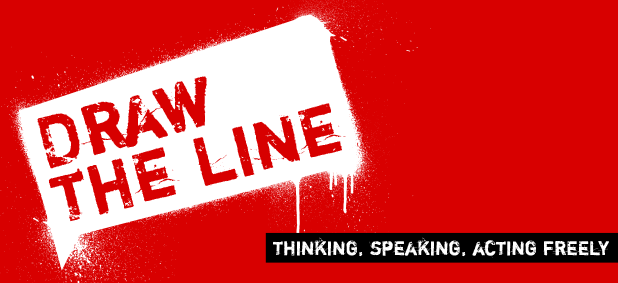28 Jan 2015 | Draw the Line, mobile, Youth Board

Censorship, and the degree to which we self-censor, is becoming an increasingly difficult, yet pressing and vitally important, topic of debate amongst an ever-growing international community.
Now, in the internet age, it has never been easier to connect and communicate with so many different people from all across the world. With these wide reaching forms of communication, and various people calling for censorship at different levels, the extent to which offence is considered an acceptable and fundamental part of free speech, has been called into question.
In the wake of the Charlie Hebdo killings, some world leaders have spoken publicly against self-censorship. Australian Prime Minister Tony Abbot urged media in the country to not resort to self-censorship. Some believe that certain groups, communities or organisations should be exempt from satire, criticism or insult. Others might argue that without the right to offend, a proper line of communication can never truly be attained, that no group should be exempt, and that people have the right to offend and be offended, but not to resort to violence and extremism.
This poses the question: is causing offence, and the ability to be offended, a fundamental part of freedom of expression? And, if we remove the right to offend, does this then close down the space for free and open debate?
Tweet your thoughts to #IndexDrawtheLine to get involved in the debate.
This article was published on 28 January 2015 at indexoncensorship.org
15 Dec 2014 | About Index, Draw the Line, Young Writers / Artists Programme

Religious freedom and religious radicalism which leads to extremism has become an increasingly difficult balancing act in the digital age where presenting religious superiority through fear and “terror” is possible both locally and internationally at internet speeds.
The ongoing series of beheading videos released by the Islamic State and the showcase of kidnapped school girls by Nigeria’s Boko Haram on YouTube are both examples that test the extent to which the UN Convention of Human Rights can protect religious freedoms. According to a report by the International Humanist and Ethical Union, Egypt’s Youth Ministry are targeting young atheists vocal on social media about the dangers of religion. In Saudi Arabia, Raef Badawi was sentenced to seven years in prison in 2013 and received 600 lashes for discussing other versions of Islam, besides Wahhabism, online.
Article 18 of the Convention states that the “right includes freedom to change his religion or belief, and freedom, either alone or in community with others and in public or private to manifest his religion or belief in teaching, practice, worship and observance”. The interpretation of “practice” is a grey area – especially when the idea of violence as a form of punishment can be understood differently across various cultures. Is it right to criticise societies operating under Sharia law that include amputation as punishment, ‘hadd’ offences that include theft, and stoning for committing adultery?
Religious extremism should not only be questioned under the categories of violence or social unrest. Earlier this month, religious preservation in India has led to the banning of a Bollywood film scene deemed ‘un-Islamic’ in values. The actress in question was from Pakistan, and sentenced to 26 years in prison for acting out a marriage scene depicting the Prophet Muhammad’s daughter. In Russia, the state has banned the publication of Jehovah’s Witness material as the views are considered extremist.
In an environment where religious freedom is tested under different laws and cultures, where do you draw the line on international grounds to foster positive forms of belief?
This article was posted on 15 December 2014 at indexoncensorship.org
12 Nov 2014 | Draw the Line, Young Writers / Artists Programme
The right to vote has long been a symbol that you are seen as a valuable and worthy citizen by your government. The removal of this right is a restriction on your free expression and your ability to contribute to change in your country. But is restricting our right to vote a violation of free speech?
In the recent United States midterm elections there was controversy over the Republican’s use of voting restrictions to prevent groups — who they assumed would vote Democrat — from access to the polling station. The voter ID “fraud” laws have been accused by liberals as a shady measure to attempt to reduce voting by racial and ethnic minorities. It would also affect young people who lacked the supposedly necessary identification.
Voting age is another example of an ongoing debate surrounding this issue. Sixteen-year-olds were allowed to vote in the Scottish referendum earlier this year. Since then, people have questioned whether the voting age should be reduced to 16 for the upcoming UK general election, and whether sixteen year olds are capable of making a well informed decision. And if voting is an act of free speech, does this mean prisoners should have the opportunity to vote? If voting is truly a human right should we all have the right to vote?
This article was posted on 12 November at indexoncensorship.org
5 Nov 2014 | Draw the Line, Young Writers / Artists Programme
In response to this month’s Draw the Line question — “Do laws restrict or protect free speech?” — members of our youth advisory board discuss the different ways laws impact free expression in their home countries.
Margot Tudor talking about UK
Alice Olsson on Sweden
Sophie Armour on the UK
This article was posted on November 01, 2014 at indexoncensorship.org


![By Rama (Own work) [CC-BY-SA-2.0-fr (http://creativecommons.org/licenses/by-sa/2.0/fr/deed.en)], via Wikimedia Commons](https://www.indexoncensorship.org/wp-content/uploads/2014/11/2048px-Election_MG_3455.jpg)